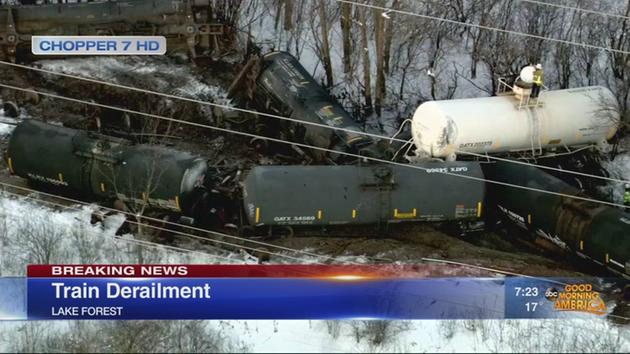Inspections began two years ago, after several accidents
 This Nov. 6, 2013 file photo shows a warning placard on a tank car carrying crude oil near a loading terminal in Trenton, N.D. Inspectors have found almost 24,000 safety defects over a two-year period along United States railroad routes used to ship volatile crude oil. Data obtained by The Associated Press shows many of the defects were similar to problems blamed in past derailments that caused massive fires or oil spills in Oregon, Virginia and Montana. (AP Photo/Matthew Brown, File)
This Nov. 6, 2013 file photo shows a warning placard on a tank car carrying crude oil near a loading terminal in Trenton, N.D. Inspectors have found almost 24,000 safety defects over a two-year period along United States railroad routes used to ship volatile crude oil. Data obtained by The Associated Press shows many of the defects were similar to problems blamed in past derailments that caused massive fires or oil spills in Oregon, Virginia and Montana. (AP Photo/Matthew Brown, File)BILLINGS, Mont. (AP) — Government inspections of railroads that haul volatile crude oil across the United States have uncovered almost 24,000 safety defects, including problems similar to those blamed in derailments that triggered massive fires or oil spills in Oregon, Virginia, Montana and elsewhere, according to data obtained by The Associated Press.
The safety defects were discovered during targeted federal inspections on almost 58,000 miles of oil train routes in 44 states. The inspection program began two years ago following a string of oil train accidents across North America, including a 2013 derailment in Lac-Megantic, Quebec, that killed 47 people.
Federal regulators said the inspections resulted in 1,118 violation recommendations, prompting railroads to become more responsive to concerns raised by track inspectors and to improve safety.
Problems identified by federal inspectors included worn rails and other equipment; bolts meant to hold tracks in place that were broken, loosened or missing; and cracks in steel bars joining sections of track. They also noted failures by railroads to quickly fix problems identified through inspections.
Such issues are not uncommon across the nation's 140,000-mile freight rail network. But they've received heightened attention after rail shipments of crude oil increased and the number of major derailments spiked following a surge in domestic energy production.
A violation recommendation occurs when an inspector finds something serious enough to warrant a potential penalty, or a railroad fails to address a defect that's been found. Federal officials declined to say how many penalties had been issued under the crude-by-rail inspection program.
A former senior official at the Federal Railroad Administration, Steven Ditmeyer, reviewed the inspection data obtained by the AP. He said it reinforces the need for railroads to stay on top of regular maintenance for their sprawling networks of track.
Many of the defects found by inspectors posed serious safety issues, Ditmeyer said, adding that it can be difficult for railroads to know when a seemingly small problem will result in a derailment.
"All of this is a call for continued vigilance," said Ditmeyer, who directed the railroad administration's Office of Research and Development for eight years. "One defect or one violation of the right kind can cause a derailment. These statistics give a good indication of the track quality, but most (defects) won't cause a derailment."
Some safety gaps found by inspectors bear similarities to the circumstances surrounding prior accidents.
In Lynchburg, Virginia, cracks in the track that went unrepaired led to a CSX Transportation oil train coming off the rails and exploding along the James River in 2014. In Culbertson, Montana, a 2015 accident that spilled 27,000 gallons of oil from a BNSF Railway train was blamed on defective or missing fasteners used to hold the tracks in place. And in Mosier, Oregon, broken rail bolts were blamed in a Union Pacific oil train derailment and fire last year.
 In this May 1, 2014, file photo survey crews in boats look over tanker cars as workers remove damaged tanker cars along the tracks where several CSX tanker cars carrying crude oil derailed and caught fire along the James River near downtown Lynchburg, Va. Inspectors have found almost 24,000 safety defects over a two-year period along United States railroad routes used to ship volatile crude oil. Data obtained by The Associated Press shows many of the defects were similar to problems blamed in past derailments that caused massive fires or oil spills in Oregon, Virginia and Montana. (AP Photo/Steve Helber, File)
In this May 1, 2014, file photo survey crews in boats look over tanker cars as workers remove damaged tanker cars along the tracks where several CSX tanker cars carrying crude oil derailed and caught fire along the James River near downtown Lynchburg, Va. Inspectors have found almost 24,000 safety defects over a two-year period along United States railroad routes used to ship volatile crude oil. Data obtained by The Associated Press shows many of the defects were similar to problems blamed in past derailments that caused massive fires or oil spills in Oregon, Virginia and Montana. (AP Photo/Steve Helber, File)
The rail industry views safety defects as warnings from regulators that action is necessary, said Association of American Railroads spokeswoman Jessica Kahanek. She said violations are a better indicator of safety problems because not all defects pose an immediate risk. Hundreds of the violation recommendations on oil train routes were "paperwork-related," Kahanek said, such as railroads not providing required forms to government inspectors.
Omaha, Nebraska-based Union Pacific received most of the violation recommendations issued under the targeted inspection program, with more than 800. A breakdown for violations involving other railroads was not available.
Union Pacific agreed to increase its inspection frequencies following the Mosier derailment under an agreement with federal regulators who said the railroad's inspection program was too lax.
Union Pacific spokeswoman Calli Hite said the railroad shares the Federal Railroad Administration's dedication to safety and safety compliance.
"Union Pacific has always paid close attention to track conditions and inspections," Hite said.
 In this June 3, 2016, file image, from video provided by KGW-TV, smoke billows from a Union Pacific train that derailed near Mosier, Ore., in the scenic Columbia River Gorge. Oregon legislators are considering two environmentally related bills in their current session. One bill would direct the Environmental Quality Commission to adopt oil-spill prevention and emergency-response planning requirements to railroads that own or operate high hazard train routes. The other would prohibit the Legislature from funding new bulk coal or oil terminals. (KGW-TV via AP, File)
In this June 3, 2016, file image, from video provided by KGW-TV, smoke billows from a Union Pacific train that derailed near Mosier, Ore., in the scenic Columbia River Gorge. Oregon legislators are considering two environmentally related bills in their current session. One bill would direct the Environmental Quality Commission to adopt oil-spill prevention and emergency-response planning requirements to railroads that own or operate high hazard train routes. The other would prohibit the Legislature from funding new bulk coal or oil terminals. (KGW-TV via AP, File)
Most violations were found in the months after the inspection program began in January 2015 in the U.S. Southwest, where officials said Union Pacific runs a majority of the oil trains. In many cases, violation recommendations came after the railroad did not respond quickly enough to problems found by inspectors, said Marc Willis, a spokesman for the railroad administration.
Subsequent inspections turned up thousands of additional safety problems but far fewer recommendations for violations.
That was because the high number of violation recommendations for Union Pacific sent a message to the entire industry to quickly address any issue raised by inspectors, officials said.
"Railroads are paying closer attention," Willis said, adding that derailments have fallen 10 percent since the inspection program began. "Although many minor defects still are being identified ... both FRA and railroad inspectors are finding fewer serious conditions, resulting in significant safety improvements."
It's uncertain whether the targeted inspection program for oil trains will continue under the Trump administration, he said.
Since 2006, the United States and Canada have seen at least 27 oil train accidents involving a fire, derailment or significant fuel spill. Besides the targeted inspection program, U.S. and Canadian officials have responded with more stringent construction standards for tens of thousands of tank cars that haul oil and other flammable liquids.
The amount of oil moving by rail peaked in 2014 then dropped after crude prices collapsed. Major railroads reported moving more than 43,000 carloads of crude in the fourth quarter of 2016, down almost 50 percent from a year earlier, according to the railroad association.








